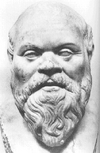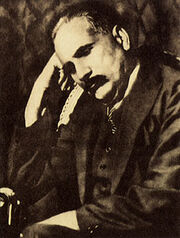(→Forums) |
|||
| Line 273: | Line 273: | ||
===Forums=== |
===Forums=== |
||
| + | *[http://philosophy-forums.com Philosophical Forums ] Discuss a wide range of philosophical topics online. |
||
*[http://www.ephilosopher.com Ephilosopher] Online philosophy forum for philosophers, philosophy students, and anyone interested in philosophy. |
*[http://www.ephilosopher.com Ephilosopher] Online philosophy forum for philosophers, philosophy students, and anyone interested in philosophy. |
||
*[http://www.galilean-library.org/academy/ The Academy] A place to discuss philosophy from basic to advanced levels, with a library of introductory essays for beginners |
*[http://www.galilean-library.org/academy/ The Academy] A place to discuss philosophy from basic to advanced levels, with a library of introductory essays for beginners |
||
Revision as of 04:51, 21 March 2007
Assessment |
Biopsychology |
Comparative |
Cognitive |
Developmental |
Language |
Individual differences |
Personality |
Philosophy |
Social |
Methods |
Statistics |
Clinical |
Educational |
Industrial |
Professional items |
World psychology |
Philosophy Index: Aesthetics · Epistemology · Ethics · Logic · Metaphysics · Consciousness · Philosophy of Language · Philosophy of Mind · Philosophy of Science · Social and Political philosophy · Philosophies · Philosophers · List of lists

The philosopher, by Rembrandt (detail).
The term philosophy comes from the ancient Greek word "Φιλοσοφία" (philo-sophia), which means "love of wisdom". In a modern context, it is used to refer to debates concerning topics such as what exists, what knowledge is and whether it is possible, and how one should live. Philosophical literature is typically characterized by its use of reasoning in order to advance cogent arguments about these topics. Typically, these arguments involve consideration of competing views and their perceived inadequencies.
Informally, a "philosophy" may refer to a general world view or to a specific ethic or belief.
Definition
- Main article: Definition of philosophy
There is some broad agreement that philosophy is characterised by a certain method, subject matter, and objectives.
Philosophy has a critical or skeptical nature. Philosophers try wherever possible to examine and criticise beliefs that are commonly taken for granted. Philosophy students are taught not to take anything on trust, "particularly if it seems obvious and undeniable" (Hodges). Rather, they are encouraged to provide good reasons for any conclusions they come to.
The role of empirical experimentation in philosophy is questionable. Some philosophers believe that philosophy is not experimental. These philosophers may believe that philosophy does not employ the methods of empirical science, and its questions cannot be answered by observation or experiment, although observation and experiment may prompt those questions. However, this was not the attitude taken by ancient Hellenistic philosophers, who saw any intellectual investigation as philosophy. Quite the opposite: science in general used to be known as "natural philosophy".
Philosophy generally concerns itself with what are sometimes called 'the big questions'. For example: "What is the meaning of life? How did the world begin? Do I have a soul? Will my soul survive my death? What really exists? Could nothing have ever existed?".
Philosophers disagree on the goal of philosophical enquiry. Those attracted to the 'big questions' say the point of philosophy is to discover the absolutely fundamental reasons behind everything, or to unify and transcend the insights given by science and religion. Others say that, at most, the goal of philosophy is to make explicit, or to clarify, the nature and significance of ordinary and scientific beliefs. Indeed, the unifying goal behind philosophical inquiry may simply be the process of thinking through interesting questions.
Rather than merely using the concepts that are usually employed in everyday life in thinking about the world, philosophy also makes those concepts themselves the object of study. Philosophy, in this respect, may involve thinking about thinking.
Branches of philosophy
There is no universal agreement about which subjects are the main branches of philosophy. The Aristotelian division was as follows:
- First philosophy (metaphysics), of which the main area is ontology (the study of kinds of existence or being).
- Cosmology. This includes the nature of material substance, of quality and quantity, of space, causation, and change.
- Psychology. This is a much wider and more "philosophical" subject than the modern subject of the same name, encompassing the philosophy of perception, the theory of knowledge, and the nature of the soul (now similar to what is called "philosophy of mind").
Aristotle regarded ethics and politics not as parts of theoretical philosophy at all, but as practical disciplines. Logic he regarded as theoretical, but not as a science in its own right, since it is a necessary preliminary to all knowledge.
The modern classification, which originates with Christian Wolff, is into four main branches: logic, metaphysics, epistemology, and ethics. Aesthetics is often considered as a fifth branch, though it is also sometimes included with ethics as "value theory" in modern philosophy departments.
- Logic: What is truth? How or why do we identify a statement as true or false? And, how do we reason?
- Epistemology: Is knowledge possible? How do we know what we know? How do we take what is "known" to extrapolate what is "unknown"?
- Ethics: Is there a difference between morally right and wrong actions (or values, or institutions)? If so, what is that difference? Which actions are right and which wrong? Are values absolute, or relative? In general or particular terms, how should I live? How is right and wrong defined? Is there an ultimate "ought"? Is there a normative value or objective that supersedes all others? Are values 'in' the world like tables and chairs and if not how should we understand their ontological status?
- Metaphysics: What is reality, and what exists? What is the nature of those things? Do some things exist independently of our perception? What is the nature of space and time? What is the nature of thought and thinking? What is it to be a person?
- Aesthetics: What is it to be beautiful? How do beautiful things differ from the everyday? What is Art? Does true beauty exist?
There are many overlapping issues between the categories.

These five broad categories are not the only areas of philosophical inquiry. Politics (seen by Aristotle as part of ethics), physics, geology, biology, meteorology, astronomy, etc., were all originally part of philosophy. The Greeks, through the influence of Socrates and his method, developed a tradition of analysis that divided a subject into its components in order better to understand it. Use of this method is what made those subjects philosophical; and since many subjects made use of that method, the scope of philosophical material was wide. In addition, a number of subfields of philosophy have enjoyed contemporary focus and research (see the applied philosophy section).
History of philosophy
Main articles: History of philosophy, History of Western philosophy, and Eastern philosophy
Traditionally, the history of western philosophy is divided into three areas: Ancient Greek, Medieval, and Modern. There is also now focus being put on the post-modern period, especially existentialism. Étienne Gilson, in his book The Unity of Philosophic Experience, attempts to show important connections between the ideas of the medieval period and their development in the modern period; this is contrary to traditional interpretations of modern philosophy as a new era unconcerned with the past.
Ancient Greek philosophy is typically divided into the pre-Socratic Period, the philosophy of Plato, and the philosophy of Aristotle. Important pre-Socratic philosophers include Thales, Anaximander, Anaximenes, Parmenides, and Heraclitus. Socrates and his pupil Plato revolutionized philosophy. While Socrates wrote nothing, his influence survives through that of his pupil. Plato defined the issues with which philosophy still wrestles.
One of the greatest synthesizers of Christian and Aristotelian thought was Thomas Aquinas. His synthesis of Aristotelian metaphysics and practical reasoning with Christian teaching became characteristic of medieval philosophy.
Descartes, who is often called the father of modern philosophy, proposed that philosophy should begin with a radical skepticism about the possibility of obtaining reliable knowledge. In his Meditations, he systematically destroys all the foundations of knowledge except one (I am thinking, therefore I am), and then uses this single indubitable fact to rebuild a system of knowledge.
The British Empiricists, John Locke and the Anglo-Irish George Berkeley and David Hume, developed a form of Scepticism and naturalism on roughly scientific principles. Hume was heavily influenced by empiricists John Locke, George Berkeley, Isaac Newton, and Samuel Clarke.
Immanuel Kant wrote his Critique of Pure Reason in an attempt to reconcile the conflicting views and establish a new groundwork for studying metaphysics rooted in the analysis of the conditions for the possibility of knowledge.
By the late 19th Century, however, several important philosophers argued against the Kantians' skeptical attitude. One of the most influential was Edmund Husserl, who founded the philosophical mode known as phenomenology.
Philosophical traditions
The modern period in philosophy, beginning in the late nineteenth century to the 1950's, was marked by a developing schism in philosophy between 'Continental' tradition, which is mainly Franco-German, and the English and American 'Analytic' tradition.
Both traditions appear radically different, yet they have a common root, namely a rejection of the Cartesian and empiricist tradition that dominated philosophy since the early modern period, and particularly of the psychologism that pervaded the logic and method of Idealist philosophy.
What underlies the analytic tradition is the view (originally defended by Ockham) that philosophical error arises from misunderstandings generated by language. We imagine that to every word (e.g. 'baldness', 'existence') there corresponds something in reality. According to analytic philosophers, the true meaning of ordinary language sentences is, somewhat misleadingly, concealed by their grammatical form, and we must translate them into their true form (known as logical form) in order to clarify them. The difficulty, as yet unresolved, is to determine what the correct logical form must be. Some philosophers (beginning with Frege and Bertrand Russell), have argued that first order logic shows us the true logical form of ordinary language sentences. Russell's The Philosophy of Logical Atomism is an outline of such a project, Wittgenstein's Tractatus is a more detailed attempt, although famously obscure and aphoristic.

Ludwig Wittgenstein (1889-1951)
Continental philosophy, in the hands of the phenomenologists such as Edmund Husserl and Maurice Merleau-Ponty, took a different turn, in its preoccupation with consciousness. A fundamental assumption of this school is that mental phenomena have intentionality, they have objects, external to and independent of the mind itself. Thus an important theme of phenomenology is an attack on the subject-object dualism of Cartesianism.
Yet this is an assumption shared by analytic philosophers. A similar idea (though developed from a somewhat different starting point) is the view known as externalism defended recently by philosophers such as John McDowell and Gareth Evans. This is that proper names ('Socrates', 'George Bush') refer directly to their bearers, and that their meaning is not mediated by any 'sense' or subjective meaning. Thus the thought 'Socrates is wise' has Socrates himself as a component, and thus there can be no question of our being radically mistaken as to the nature or existence of an external world. Such a mistake would make no sense – literally so, for if the question of whether the Eiffel Tower, London exists, were intelligible, we would have to admit the possibility that those names have no meaning, and thus that the question was not intelligible in the first place. This is strikingly similar to themes found in 'Continental' writers such as Heidegger, who argues that the 'scandal of philosophy' is not that the proof of the existence of an external world has yet to be given, but that such proofs are expected and attempted again and again. To have faith in the reality of the "external world", presupposes a subject which is worldless. But we are embedded in the world.
Other traditions
Members of many societies have considered philosophical questions and built philosophic traditions based upon each other's works. Eastern and Middle Eastern philosophical traditions have influenced western philosophers. Russian, Jewish, Islamic and recently Latin American philosophical traditions have contributed to, or been derivative of western philosophy, yet retain a distinctive identity.
The differences between traditions are often based on their favored historical philosophers, or emphases on ideas, styles or language of writing. The subject matter and dialogues of each can be studied using methods derived from the others, and there have been significant commonalities and exchanges between them.
Other philosophical traditions, such as African, are rarely considered by foreign academia. On account of the widespread emphasis on western philosophy as a reference point, the study, preservation and dissemination of valuable but not widely known non-western philosophical works faces many obstacles.
Languages can either be a barrier or a vehicle for ideas. The question of which specific languages can be considered essential to philosophizing is a theme in the works of many recent philosophers.
Western and Eastern philosophy
Main articles: Western philosophy and Eastern philosophy

Muhammad Iqbal (1877–1938)
Eastern philosophy follows the broad traditions that originated or were popular in India, Persia, the Middle East, and China
Philosophical thinking also developed elsewhere, and can be seen in many ancient texts. In China, the Tao Te Ching of Laozi and the Analects of Confucius both appeared around 600 BCE, about the same time as the Greek pre-Socratics were writing. In India, major philosophical texts include the Upanishads and the Bhagavad Gita, from circa 500 BCE (see Hindu philosophy). In Persia, Zarathustra's teachings which were a new basis for the Iranian branch of Indo-Iranian philosophy appeared around 900 BC. Islamic civilization also produced many philosophical geniuses such as, Ibn Sina (Avicenna), Ibn Rushd (Averroës), and Al-Ghazali (see Islamic philosophy).
At least since the publication of Bertrand Russell's History of Western Philosophy the most prominent division of philosophy has been between the philosophies of the "West" and the "East". The western philosophical tradition began with the Greeks, while that of Asia originated, largely, in China and the Indian subcontinent.
Applied philosophy
Though often seen as a wholly abstract field, philosophy is not without practical applications. The most obvious applications are those in ethics – applied ethics in particular – and in political philosophy. The political philosophies of Confucius, Kautilya, Sun Tzu, Immanuel Kant, John Locke, Thomas Hobbes, Niccolo Machiavelli, Jean-Jacques Rousseau, Karl Marx, John Stuart Mill, Mahatma Gandhi, Robert Nozick, and John Rawls have shaped and been used to justify governments and their actions.
In the field of the philosophy of education, progressive education as championed by John Dewey has had a profound impact on educational practices in the United States in the twentieth century.
Other important applications can be found in epistemology, which might help one to regulate one's notions of what knowledge, evidence, and justified belief are. Philosophy of science discusses the underpinnings of the scientific method. Aesthetics can help to interpret discussions of art. Even ontology, surely the most abstract and least practical-seeming branch of philosophy, has had important consequences for logic and computer science.
In general, the various "philosophies of," such as philosophy of law, can provide workers in their respective fields with a deeper understanding of the theoretical or conceptual underpinnings of their fields.
Often, philosophy is seen as an investigation into an area not understood well enough to be its own branch of knowledge. What were once philosophical pursuits have evolved into the modern day fields of psychology, sociology, linguistics, and economics (among others). Computer science, cognitive science and artificial intelligence are modern areas of research that philosophy has played a role in developing.
See also
General philosophy topics
|
General philosophy lists
|
History of philosophy
|
|
Philosophy of ...
|
References & Bibliography
Introductions
For beginners
- Blumenau, Ralph. Philosophy and Living ISBN 0907845339
- Craig, Edward. Philosophy: A Very Short Introduction. ISBN 0192854216
- Gaarder, Jostein. Sophie's World. ISBN 0425152251
- Higgins, Kathleen M. and Solomon, Robert C. A Short History of Philosophy. ISBN 0195101960
- Russell, Bertrand. The Problems of Philosophy. ISBN 019511552X
- Sober, E. (2001). Core Questions in Philosophy: A Text with Readings. Upper Saddle River, Prentice Hall. ISBN 0131898698
- Solomon, Robert C. Big Questions: A Short Introduction to Philosophy. ISBN 053416708X
- Stevenson, Jay. The Complete Idiot's Guide to Philosophy (2nd Edition). ISBN 0028643380
- Warburton, Nigel. Philosophy: The Basics. ISBN 0415146941
- What Philosophy Is.
- Philosophy Now.
- The Philosophy Manuscripts.
Topical introductions
- Copleston, Frederick. Philosophy in Russia: From Herzen to Lenin and Berdyaev. ISBN 0268015694
- Critchley, Simon. Continental Philosophy: A Very Short Introduction. ISBN 0192853597
- Hamilton, Sue. Indian Philosophy: a Very Short Introduction. ISBN 0192853740
- Imbo, Samuel Oluoch. An Introduction to African Philosophy. ISBN 0847688410
- Kupperman, Joel J. Classic Asian Philosophy: A Guide to the Essential Texts. ISBN 0195133358
- Leaman, Oliver. A Brief Introduction to Islamic Philosophy. ISBN 0745619606
- Lee, Joe and Powell, Jim. Eastern Philosophy For Beginners. ISBN 0863162827
- Nagel, Thomas. What Does It All Mean? A Very Short Introduction to Philosophy. ISBN 0195052927
- Scruton, Roger. A Short History of Modern Philosophy. ISBN 0415267633
- Smart, Ninian. World Philosophies. ISBN 0415228522
- Stevenson, Jay. Complete Idiot's Guide to Eastern Philosophy. ISBN 0028638204
- Tarnas, Richard. The Passion of the Western Mind: Understanding the Ideas That Have Shaped Our World View. ISBN 0345368096
- The Branches of Philosophy
- A Glossary of Terms
Anthologies
- Philosophic Classics: From Plato to Derrida (4th Edition) by Forrest E. Baird
- The Story of Philosophy by Will Durant
- Classics of Philosophy (Vols. 1 & 2, 2nd edition) by Louis P. Pojman
- Classics of Philosophy: The 20th Century (Vol. 3) by Louis P. Pojman
- The English Philosophers from Bacon to Mill by Edwin Arthur Burtt
- European Philosophers from Descartes to Nietzsche by Monroe Beardsley
- Contemporary Analytic Philosophy: Core Readings by James Baillie
- Existentialism: Basic Writings (Second Edition) by Charles Guignon, Derk Pereboom
- The Phenomenology Reader by Dermot Moran, Timothy Mooney
- Medieval Islamic Philosophical Writings edited by Muhammad Ali Khalidi
- A Source Book in Indian Philosophy by Sarvepalli Radhakrishnan, Charles A. Moore
- A Source Book in Chinese Philosophy by Wing-tsit Chan
- Kim, J. and Ernest Sosa, Ed. (1999). Metaphysics: An Anthology. Blackwell Philosophy Anthologies. Oxford, Blackwell Publishers Ltd.
- The Oxford Handbook of Free Will (2004) edited by Robert Kane
Reference works
- The Oxford Companion to Philosophy edited by Ted Honderich
- The Cambridge Dictionary of Philosophy by Robert Audi
- The Routledge Encyclopedia of Philosophy (10 vols.) edited by Edward Craig, Luciano Floridi (also available online by subscription); or
- The Concise Routledge Encyclopedia of Philosophy edited by Edward Craig (an abridgement)
- Routledge History of Philosophy (10 vols.) edited by John Marenbon
- History of Philosophy (9 vols.) by Frederick Copleston
- A History of Western Philosophy (5 vols.) by W. T. Jones
- Encyclopaedia of Indian Philosophies (8 vols.), edited by Karl H. Potter et al (first 6 volumes out of print)
- Indian Philosophy (2 vols.) by Sarvepalli Radhakrishnan
- A History of Indian Philosophy (5 vols.) by Surendranath Dasgupta
- History of Chinese Philosophy (2 vols.) by Fung Yu-lan, Derk Bodde
- Encyclopedia of Chinese Philosophy edited by Antonio S. Cua
- Encyclopedia of Eastern Philosophy and Religion by Ingrid Fischer-Schreiber, Franz-Karl Ehrhard, Kurt Friedrichs
- Companion Encyclopedia of Asian Philosophy by Brian Carr, Indira Mahalingam
- A Concise Dictionary of Indian Philosophy: Sanskrit Terms Defined in English by John A. Grimes
- History of Islamic Philosophy edited by Seyyed Hossein Nasr, Oliver Leaman
- History of Jewish Philosophy edited by Daniel H. Frank, Oliver Leaman
- A History of Russian Philosophy: From the Tenth to the Twentieth Centuries by Valerii Aleksandrovich Kuvakin
- Ayer, A. J. et al. Ed. (1994) A Dictionary of Philosophical Quotations. Blackwell Reference Oxford. Oxford, Basil Blackwell Ltd.
- Blackburn, S., Ed. (1996)The Oxford Dictionary of Philosophy. Oxford, Oxford University Press.
- Mauter, T., Ed. The Penguin Dictionary of Philosophy. London, Penguin Books.
- Runes, D., ED. (1942). The Dictionary of Philosophy. New York, The Philosophical Library, Inc.
- Angeles, P. A., Ed. (1992). The Harper Collins Dictionary of Philosophy. New York, Harper Perennial.
- Bunnin, N. et. al.,Ed.(1996) The Blackwell Companion to Philosophy. Blackwell Companions to Philosophy. Oxford, Blackwell Publishers Ltd.
- Popkin, R. H. (1999). The Columbia History of Western Philosophy. New York, Columbia University Press.
- An historical time line.
External links
Some of these websites contain links to online texts of philosophy, as do many related articles on Wikipedia.
Resources
- Cultural And Ethinicity In Philosophy A sampling of philosophies in certain geographical areas. Warning: some links are not updated.
- Philosophical Society.com Offers an exhaustive reference library and passages from philosophical works.
- Dictionary of Philosophical Terms and Names
- Philosophies and Philosophers
- EpistemeLinks.com : philosophy resources on the internet
- Erratic Impact: The Philosophy Research Base
- Guide to Philosophy on the Internet
- The Internet Encyclopedia of Philosophy
- Introducing Philosophy Series by Paul Newall, aimed at beginners.
- Introduction to Philosophy (abridgement of other sources) (currently unavailable)
- Plato's Heaven An introductory guide to major philosophical topics and debates.
- Melbourne Philosophy: Philosophy in Melbourne, Australia (noncommercial, variety of resources, wiki)
- Philosophy around the Web
- Philosophy @ large, A webguide for the philosophy community provided by Liverpool University
- Philosophy in Cyberspace
- Routledge Encyclopedia of Philosophy - Signpost articles free, others require subscription
- Stanford Encyclopedia of Philosophy
- Philosophy Talk A radio program that questions everything except your intelligence
Online bibliographies
e-texts
|
eJournals
|
Forums
- Philosophical Forums Discuss a wide range of philosophical topics online.
- Ephilosopher Online philosophy forum for philosophers, philosophy students, and anyone interested in philosophy.
- The Academy A place to discuss philosophy from basic to advanced levels, with a library of introductory essays for beginners
- Blueskyboris' Love Of Wisdom Debates Ongoing debate on the veracity of the words of the greats
- BUPS-DIS Discussion list of the British Undergraduate Philosophy Society
- Groves of Academe A discussion board covering philosophy, logic/mathematics, culture, literature, the arts, and technology.
- I Love Philosophy Large philosophy forum with areas for experts and novices.
- Internet Infidels Philosophical Forums Debate about atheist/theist issues, philosophy of science, ethics and morals, and general philosophy.
- LifeTheory.com Online community for philosophers, spiritual gurus, and big intellects.
- The Philosophy Forum maintained by David Thunder from the University of Notre Dame
- Philosophy Forums A place to discuss Philosophy, with a discursive library on Philosophical topics.
- PhiloWiki The complete Wiki-site for the development of multiple points of view on a range of philosophical topics
- Philter Philosophy's Forum Page A resource for learning and discussing philosophy
- Seekers of Truth Forums A place to discuss philosophies of religion, and other such topics
- Sicetnon.org eJournal for philosophy and culture. Discussion-board and journal.
- Talk Philosophy Place to discuss topics in all areas of philosophy from ethics to aesthetics
- WikiCity of Philosophy A WikiCity dedicated to philosophy, set up to collect and discuss any & everything about philosophy
- FrostCloud.com General Philosophy Thought-provoking, philosophical discussions.
Organizations, websites, and associations
| General: Philosophy: Eastern - Western | History of philosophy: Ancient - Medieval - Modern | Portal |
| Lists: Basic topics | Topic list | Philosophers | Philosophies | Glossary of philosophical "isms" | Philosophical movements | Publications | Category listings ...more lists |
| Branches: Aesthetics | Ethics | Epistemology | Logic | Metaphysics | Philosophy of: Education, History, Language, Law, Mathematics, Mind, Philosophy, Politics, Psychology, Religion, Science, Social philosophy, Social Sciences |
| Schools: Agnosticism | Analytic philosophy | Atheism | Critical theory | Determinism | Dialectics | Empiricism | Existentialism | Humanism | Idealism | Logical positivism | Materialism | Nihilism | Postmodernism | Rationalism | Relativism | Skepticism | Theism |
| References: Philosophy primer | Internet Encyclo. of Philosophy | Philosophical dictionary | Stanford Encyclo. of Philosophy | Internet philosophy guide |
| This page uses Creative Commons Licensed content from Wikipedia (view authors). |



